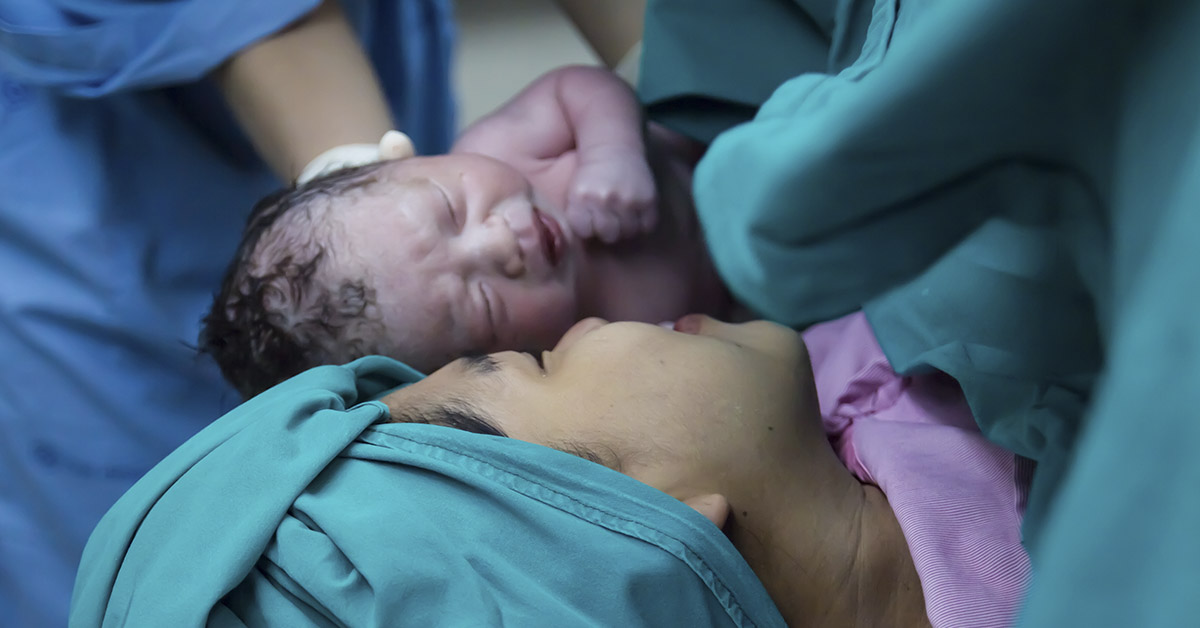Many animal mothers instinctively lick their newborns to clean them. This act of grooming is important for several reasons. One, it removes amniotic fluid, which conducts heat away from the body and warms the baby. Plus, it stimulates the newborn and brings their attention to their mother. Another possibility is that licking removes the smell of newborn babies, which could prevent predators from picking up the scent. As for human mothers, some may never admit this out loud, but they felt the urge to lick their newborn baby as well.
“An instinctual act of love”
A photo of a mother acting on this instinct went viral on social media, creating a discussion around licking babies, a discussion many people would have never predicted. The photo was taken by maternity photographer Ludy Siqueira of Senhoritas Fotografia, but it was posted on doula and childbirth educator Flor Cruz’s social media accounts. She explains the reasons why mammals in the wild lick their newborns and how this trait evolved for humans.
“Most of us have the urge to lick but resist the urge to do it and we have evolved our licking instinct into smelling our babies, kissing them vigorously, holding them close and we have returned to consuming our placentas,” wrote Cruz. “All this also sends your body signals on what antibodies to send your baby through breastmilk, it stimulates your baby, bonds and socializes him.
“But some mothers still have the strong urge to lick their newborns,” she concluded. “And they do just that. A physiological necessity. A calling from ancestors. Instinctual acts of love and ensuring the survival of young.” [1]
This is apparent in the photo, a raw, candid moment soon after birth when the mother lovingly licks her baby’s head. It’s worth noting that the mother and baby look like they’re in a shower, so it may have washed the newly-born gunk off of the infant. While the idea of licking babies may sound off-putting, the mother makes it look like the most natural thing in the world.
“I could just eat you up!”
There are many reasons why mammals might lick their newborns, from cleaning the child to protecting it from predators. But human mothers don’t feel the urge to lick their babies for those purposes. They do it for another reason animals do it: to bond with their children. “It makes sense since all other mammals lick their newborns,” said Dr. Kim Langdon, MD, an OB/GYN . “It may help with bonding and the breastfeeding process since the baby would feel the tongue and not just the holding or cuddling as a form of bonding.” [2]
But no mother should feel pressured to lick her baby if she doesn’t want to, but neither should she suppress the urge if that’s how she wants to show her love at that moment. “In my doula experience, the actual licking is not that common, but I do wonder if it’s because many new mothers are suppressing the instinct,” said Jada Shapiro, a postpartum doula. “All mammals lick their young, but there is a strong motivation for humans to act differently than our mammal friends and not be seen as an animal.”
If mothers licking babies still seems off-putting, consider how parents show affection to their infants. They kiss them, they nuzzle them, they pretend to gobble them up, they playfully nip at their tiny fingers and toes. They say the babies are “so cute, I could just eat them!” Johannes Frasnelli, a researcher in the Department of Psychology at the University of Montreal, explains that the smell of newborns triggers the same system in the mothers’ brains as hunger. So there is a scientific reason we call babies “delicious”. Licking isn’t common, but it’s not far off from other shows of affection. [3]
Licking Babies with Love
Remember, many mothers don’t feel the instinct to lick their babies all the time; it usually comes after the delivery. “The most common time you’ll see a lick is right after birth, where the birthing parent is still deep in the instinctive mode of childbirth,” says Shapiro. “The licks I have seen are light and small, almost little tastes that can be confused with a sloppy kiss.”
Aside from bonding, licking might have a physical benefit. It might help with the newborn’s immunity. “It’s possible that there is some conferred immunity since there are antibodies in saliva, namely Immunoglobulin E (IgE) which can help ward off allergies,” says Dr. Langdon. “By exposing the baby’s skin to IgE, it may help prevent rashes or other allergens from causing rashes.”
Nevertheless, to prevent passing any infections to the baby, ensure your hands and mouth are clean, especially if you are planning on licking the baby. Also, where you lick is important. Dr. Langdon recommends avoiding the nose, eyes, mouth, and genitals. But the top of the head or the toes are safe areas. And don’t stress too much about disinfecting your mouth. “There is no way to eradicate bacteria from the mouth so I would not worry about it,” says Dr. Langdon. “Especially when you remember that the baby already came through the microbiome of the vagina and has likely been exposed to the same or similar bacteria.”
Keep Reading: She thought anxiety and drinking made her ill. The truth was scarier.
Sources
- “Some Moms Want To Lick Their Newborns After Childbirth. Here’s Why.” Scary Mommy. Wendy Wisner. August 9, 2018
- “Some Moms Lick Their Newborns Right After Birth, & It’s Totally Fine.” Romper. Jennifer Parris. February 13, 2021
- “Why Women Don’t Lick Their Babies Clean After Childbirth.” How Stuff Works. Stell Simonton.

